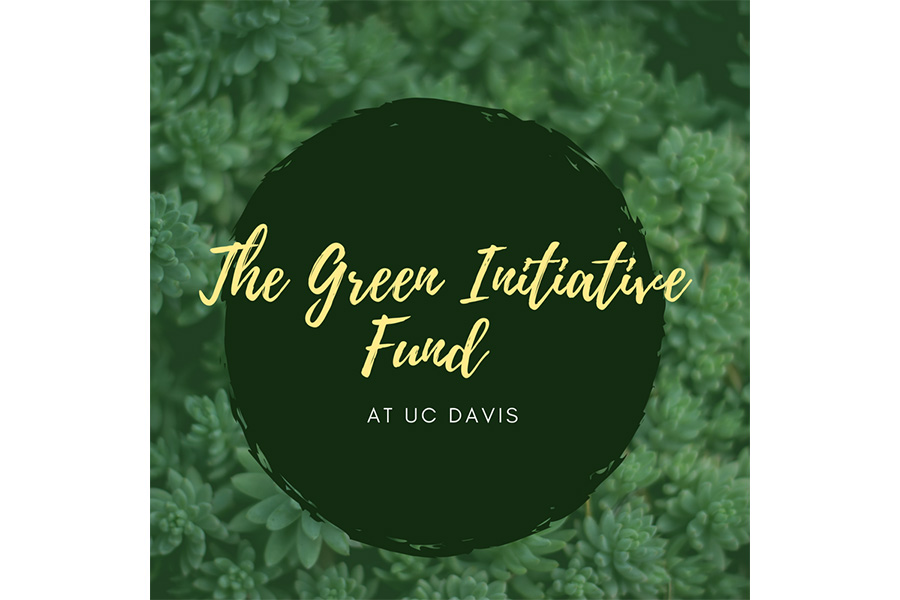
New ASUCD unit offers grant opportunity for sustainability projects
Sustainability, making an impact, leadership experience, funding: these are the keys that The Green Initiative Fund (TGIF) offers to the UC Davis community to unlock sustainability projects of its own creation.
“Are you worried that funding is holding you back from seeing a really cool project through?” said fourth-year environmental policy analysis and planning major Chase McFadden. “Then ASUCD’s TGIF is here to bridge that gap between [an] idea and actually turning your project into reality and making it happen.”
TGIF, born of an ASUCD fee initiative, is a “green bank” that offers grants to all UC Davis community members interested in improving campus sustainability from many different vantage points. According to McFadden, funded projects will promote environmental awareness, improve educational opportunities, engage in sustainable research, advocate for environmental justice and address other waste-reduction and restoration efforts.
Sarah Risher, a fourth-year environmental policy analysis and planning major and chair of the TGIF Committee, insisted upon the importance of community participation in sustainability efforts on campus.
“To me, it’s all about student empowerment and student voices and students making decisions about what affects them,” Risher said. “I feel like in the institutions that we are raised in, there’s a lot of communities that don’t have voices and are underrepresented and a lot of discrimination against young people […] To me, the mission of TGIF is to give students voices and to give students the tools to turn their ideas into reality.”
This multilateral mission provides funding — $2,000 during the fall application season and $20,000 in winter — for students, faculty and staff to address issues of sustainability that may or may not fall under the two major UC-wide goals: become zero-waste by 2020 and become carbon-neutral by 2025. The last day to apply for the fall mini-grant is Nov. 13.
In-committee alliances attach TGIF to the resources of the Office of Sustainability, Campus Planning and Environmental Stewardship and, of course, ASUCD.
“It’s kind of a unique ASUCD program in that it’s not directly tied to ASUCD operations,” McFadden said.
TGIF operations fall under the ASUCD budget and it is of interest to ASUCD because it uses student fees and is intended to serve undergraduate students first and foremost. Thus, grant proposals to TGIF should improve campus sustainability and especially affect the sustainability of undergraduate experiences.
Representing Campus Planning and Environmental Stewardship is Robert Segar, a staff member on the TGIF committee.
“We are responsible for long-range planning for the UC Davis campus environment,” Segar said. “Creating a sustainable future is at the core of what we do. It will be a great help to us to have students advancing the cause, and we think we can cue up some great opportunities for students to participate. I think the biggest opportunity going forward is to more fully integrate student engagement and student learning into our sustainability efforts.”
Annaliese Franz, a TGIF faculty committee member, researcher and associate professor of chemistry, studies catalysts and the ways in which they make chemical reactions more efficient, among other innovations focused on efficiency. Franz’s position as the director of the Undergraduate Research Center is notable, as she provides a liaison between the campus center and potential grant applicants for research projects.
“We generally try to empower and help inspire students from all over campus, and so basically anytime there’s an opportunity to have a partnership to help students get involved in research, we’re excited to do that,” Franz said. “Everyone has these unique opportunities where they contribute to the community, and each person is going to have a different idea, and that’s why instead of having one committee coming up with ideas, by having the opportunity to basically give the financial resources to small amounts to different groups, different people will come up with more ideas.”
While faculty members often apply for grants and funding, the rest of the UC Davis community may be foreign to the endeavor. This doesn’t disqualify anyone from earning the grant, though, as it is the knowledge that comes from working in different capacities across campus that qualify an applicant to speak on gaps in sustainability.
“Faculty or professors have more access to grants, obviously they do research all the time, and so we do want to reach out to janitorial staff, or the career staff [who are] not professors because they are on the ground everyday, they know this campus inside and out, it’s their community as well, and they have great ideas too,” Risher said. “I know different […] students, groups or just individual students see different needs and I think that’s the great thing about TGIF is that it allows people to bring those [ideas] forward where admin can’t see them, or ASUCD can’t see them.”
Written by: Stella Sappington — features@theaggie.org



